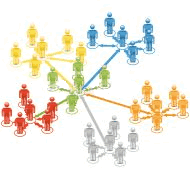Tertiary Higher Education for People in Mid-life (THE-PM)
Funding Strand: KA1 POLICY COOPERATION AND INNOVATION of EC (Transversal Programme)
Funding (total): €553,387
GU staff: Mike Osborne, Keith Hammond and Muir Houston
Lead Partner: Fundación Conocimiento y Desarrollo, Barcelona (Nestor Duch, Karsten Krueger, Marti Paralleda)
University Rovira i Virgili of Tarragona (Laureano Jiménez)
Radboud University Nijmegen (Erik de Gier)
Universita degli Studi di Modena e Reggio Emilia (Michele Mariani)
Navreme Boheme, s. r. o. (Jakub Štogr)
Institute of Sociology, Hungarian Academy of Sciences (Csaba Makor and Péter Csizmadia)
Institut Arbeit und Technik, University of Applied Sciences (FH) Gelsenkirchen (Fikret Öz)
The main challenges of the ageing in the knowledge economy are constant upgrading of the skills of those active in the labour market, and mitigating new and old social risks. People in mid-life are increasingly exposed to risks of exclusion from the labour market and lifelong learning. The inclusion of this age group in HE is one of the main challenges of education and training systems.
TLL is considered a key to develop more inclusive and responsive universities. Opening HE for mid-life learners, designing flexible pathways from VET and professional experience to higher education, flexible learning arrangements linking family-work life and learning, and the adaptation of novel didactical methods in HE are challenges to confront problems within an ageing knowledge society.
The project aims to study the TLL of HE institutes in several countries with respect to inclusion of mid-life learners. At the core stands a comparative study with concrete examples that analyse statistically available data and a series of interviews with decision makers, stakeholders, lecturers and mid-life learners. The study will analyse the efficiency of TLL programs to achieve the inclusion of mid-life learners.
The project will use a innovative combination of the Transitional Labour Market approach to define and measure the state of social risks; and the Capability and Capital approach to operationalize employability and well-being. It will also develop innovative tools and instruments to measure social quality.
Besides evidence on the social performance of European TLL, the project will facilitate mutual learning between HE decision-makers, stakeholders, practitioners and learners. Their involvement in the project form the outset will allow provision not only of reports, but also practice-oriented recommendations, tested tools and instruments for their integration in management routines. It assures that the outcomes will be widely known beyond the project boundaries, increasing their influence in institutions, systems and policies.
 Printer-friendly version
Printer-friendly version- 127 reads





